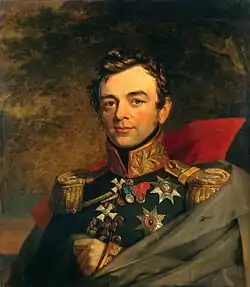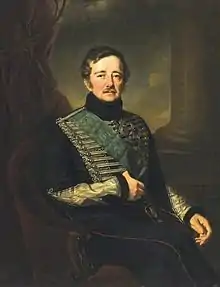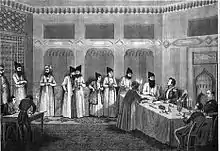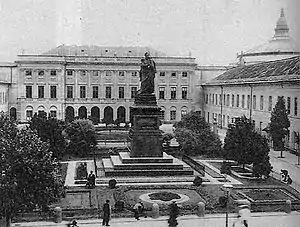Ivan Paskevich
Count Ivan Fyodorovich Paskevich-Yerevansky, Serene Prince of Warsaw (Russian: Ива́н Фёдорович Паске́вич-Эриванский, светлейший князь Варшавский, tr. Iván Fëdorovič Paskévič-Èrivanvkij, svetlejšij knjaz’ Varšavskij; 19 May [O.S. 8 May] 1782 – 1 February [O.S. 20 January] 1856) was an Imperial Russian military leader. For his victories, he was made Count of Yerevan in 1828 and Namestnik of the Kingdom of Poland in 1831. He attained the rank of field marshal in the Russian army, and later in the Prussian and Austrian armies.
Ivan Fyodorovich Paskevich | |
|---|---|
 Portrait by George Dawe | |
| Born | 19 May 1782 Poltava, Russian Empire (now Ukraine) |
| Died | 1 February 1856 (aged 73) Warsaw, Congress Poland, Russian Empire |
| Allegiance | |
| Service/ | Imperial Russian Army |
| Years of service | 1800–1856 |
| Rank | Field Marshal |
| Battles/wars | Napoleonic Wars Russo-Turkish War (1806–12) Russo-Persian War (1826–28) Russo-Turkish War (1828–29) November Uprising Hungarian Campaign Crimean War |
| Awards | Order of St. Andrew Order of St. George Order of St. Vladimir Order of St. Anna Order of St. Alexander Nevsky Order of the White Eagle (Russian Empire) Gold Sword for Bravery |
Biography
Ivan Paskevich was born in Poltava on 19 May 1782, to a well-known family of Ukrainian Cossack gentry, he was educated at the Page Corps, where his progress was rapid, and in 1800 received his commission in the Guards and was named aide-de-camp to the tsar. His first active service was in 1805, in the auxiliary army sent to the assistance of Austria against France, when he took part in the Battle of Austerlitz, 2 December 1805, where Austrian – Russian troops were defeated by the French under Napoleon.

From 1807 to 1812, Ivan Paskevich was engaged in the campaigns against the Ottomans, and distinguished himself by many brilliant and daring exploits, being made a general officer in his thirtieth year. During the war with France in 1812–1814 he was present, in command of the 26th division of infantry, at all the most important engagements, and he won promotion to the rank of lieutenant general.

On the outbreak of Russo-Persian War (1826–28) in 1826 he was appointed second in command, and, in the spring of the following year he replaced Aleksey Petrovich Yermolov as chief command.[1] Under his leadership, Echmiadzin and the Nakhichevan Khanate were conquered from the Persians.[1] After the Persians unsuccessfully tried to recapture Echmiadzin, the tsar granted Paskevich the title of "Erivanskii"[2] (Count of Yerevan), a million rubles and a diamond-mounted sword for his services. The Russo-Turkish War, 1828–1829 immediately followed and he successfully led the eastern or Caucasus front. For this he was made a Field Marshal at the age of forty-seven. In 1830, he was engaged in the Caucasian War on the territory of present-day Dagestan. At the same time he appointed the high-ranking Muslim cleric Mir-Fatah-Agha from Iran as head of the recently established Caucasus Committee. Paskevich hoped that by the help of Mir-Fattah's high stature in the Muslim community, he could make a very valuable contribution to the Russian consolidation of power in the Caucasus. Together with Mir-Fatah's high esteem among Muslims and his devised plans for the Caucasus, they managed to keep the entire Caucasus stable from rebellious Muslim insurrections for many years to come.

In June 1831, after the death of Field Marshal von Diebitsch, commander of Russian troops in Congress Poland, Paskevich was appointed his successor in crushing the Polish uprising. His armies, following the decisive success of Diebitsch at the Battle of Ostrołęka in May, advanced slowly, but Paskevich redeemed his reputation at the Battle of Warsaw, giving a death blow to Polish hopes of restoring independence. He was created Prince of Warsaw and awarded the office of Namestnik of the Kingdom of Poland. With the kingdom's autonomy limited by the Organic Statute of the Kingdom of Poland, the period under Namestnik Paskevich – known in Poland as the "Paskevich Night" – became infamous for political and economic repressions, as well as for Russification.

On the outbreak of the Hungarian Revolution of 1848 he was appointed to command the Russian troops sent to aid Austria, and finally compelled the Hungarians' surrender at Világos.
In 1854 Paskevich took command of the Army of the Danube, which was then engaging the Turks in the initial stage of the conflict which evolved into the Crimean War. Though he laid siege to Silistria, Paskevich advocated aborting the campaign due to Austria's threat to intervene in the war. On 9 June he suffered a combat injury and was compelled to return to Russia, handing command of the army to General Mikhail Dmitrievich Gorchakov. Paskevich died in Warsaw, where in 1870 a memorial was erected to him before the Koniecpolski Palace. It was demolished in October 1917 by the Poles. His remains were reburied by his son in the family mausoleum on the grounds of the Homel Palace. His widow Irina died in 1925.
References
- King, Charles (2008). The Ghost of Freedom: A History of the Caucasus. United States of America: Oxford University Press. pp. 50. ISBN 978-0-19-539239-5.
- King, Charles (2008). The Ghost of Freedom: History of the Caucasus. United States of America: Oxford University Press. pp. 51. ISBN 978-0-19-539239-5.
General references
 This article incorporates text from a publication now in the public domain: Chisholm, Hugh, ed. (1911). "Paskevich, Ivan Fedorovich". Encyclopædia Britannica. 20 (11th ed.). Cambridge University Press.
This article incorporates text from a publication now in the public domain: Chisholm, Hugh, ed. (1911). "Paskevich, Ivan Fedorovich". Encyclopædia Britannica. 20 (11th ed.). Cambridge University Press.
External links
 Media related to Ivan Paskevich at Wikimedia Commons
Media related to Ivan Paskevich at Wikimedia Commons